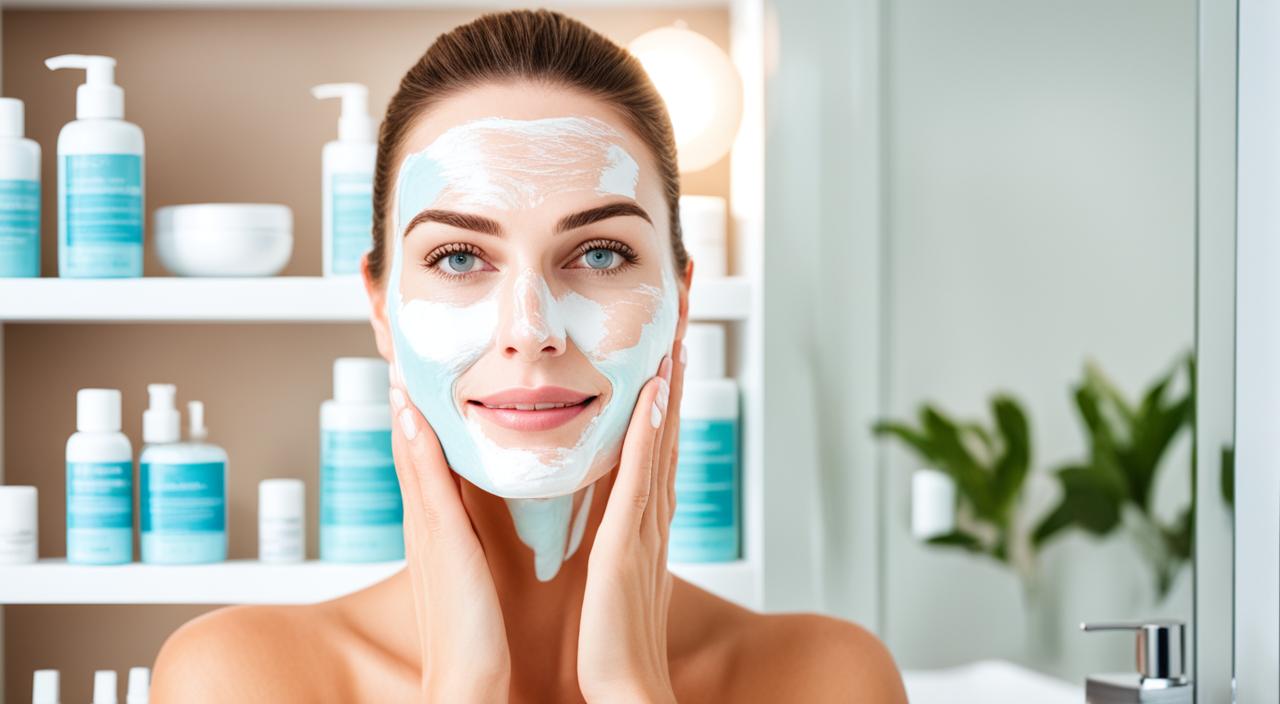Essential Skincare Routine Steps For Radiant Skin

Skincare Routine Steps Your journey toward achieving radiant skin starts with understanding your skin type and learning the essential steps of a skincare routine. By customizing your routine based on your skin concerns, selecting the right products, and adapting your regimen to different life stages, you can achieve glowing, healthy skin.
This article will guide you through the core elements of a skincare routine, tips from dermatologists, and the importance of morning and nighttime regimens for optimal results.
Key Takeaways: Skincare Routine Steps
- The key to radiant skin is understanding your skin type and tailoring your skincare routine accordingly.
- Cleansing, toning, moisturizing, and sun protection are the fundamental steps of a skincare routine.
- Targeting specific skin concerns, such as acne or hyperpigmentation, requires incorporating products with active ingredients.
- Choosing the right ingredients and reading clinical research is crucial for effective skincare.
- Building a morning and nighttime skincare routine ensures comprehensive care for your skin.
Understanding and Identifying Your Skin Type
Before embarking on a skincare routine, it is crucial to determine your skin type. Identifying your skin type allows you to select the appropriate products and address specific concerns effectively. There are four main skin types: oily, dry, combination, and sensitive.
Oily Skin
Oily skin tends to produce excess sebum, resulting in a shiny appearance. Individuals with oily skin may also be prone to acne and enlarged pores. A skincare routine for oily skin should focus on regulating oil production and maintaining a balanced complexion.
Dry Skin
Dry skin lacks moisture and can often feel tight or flaky. It may be more susceptible to sensitivity and irritation. Hydration is pivotal for individuals with dry skin, and a skincare routine should aim to replenish moisture and restore the skin’s natural barrier.
Combination Skin
Combination skin is characterized by having both oily and dry areas on different parts of the face. Typically, the T-zone (forehead, nose, and chin) has more oil production, while the cheeks and jawline may be drier. A skincare routine for combination skin should strike a balance between controlling oil in certain areas and providing hydration in others.
Sensitive Skin
Sensitive skin is easily irritated, and individuals with this skin type are more prone to redness, itching, or stinging sensations. In addition, sensitive skin may react negatively to certain skincare ingredients. A skincare routine for sensitive skin should focus on gentle, hypoallergenic products that soothe and hydrate the skin without causing irritation.
Taking the time to understand your skin type is the foundation for a successful skincare routine. By selecting products that cater to your specific needs, you can address concerns effectively and achieve healthy, radiant skin.
| Skin Type | Characteristics | Recommended Skincare |
|---|---|---|
| Oily Skin | Excess oil production, shiny appearance, prone to acne | Oil-control cleansers, non-comedogenic moisturizers, exfoliating products |
| Dry Skin | Lacks moisture, tight or flaky, prone to sensitivity | Hydrating cleansers, rich moisturizers, gentle exfoliants |
| Combination Skin | Oily T-zone, dry cheeks and jawline | Oil-balancing cleansers, lightweight moisturizers, spot treatments |
| Sensitive Skin | Easily irritated, prone to redness and itching | Fragrance-free cleansers, hypoallergenic moisturizers, gentle serums |
Understanding your skin type is the first step towards achieving your skincare goals. By customizing your routine to target your specific needs, you can nurture your skin and enhance its overall health and appearance.
The Basic Steps of a Skincare Routine
To maintain healthy and glowing skin, it’s essential to follow a skincare routine that includes the core elements of cleansing, toning, moisturizing, and sun protection. Each step plays a crucial role in keeping your skin hydrated, balanced, and protected from environmental damage.
Cleansing
Cleansing is the first and most important step in any skincare routine. It helps remove dirt, oil, and impurities that can clog your pores and lead to breakouts. Choose a gentle cleanser that suits your skin type and massage it onto your face using circular motions. Rinse thoroughly with lukewarm water to ensure all residue is removed.
Toning
After cleansing, toning helps rebalance your skin’s pH levels and prepare it for the next steps of your routine. It also helps remove any remaining traces of dirt or cleanser. Apply toner to a cotton pad and gently swipe it across your face, focusing on areas that tend to be oilier or congested.
Moisturizing
Moisturizing is crucial for replenishing moisture and keeping your skin hydrated throughout the day. Choose a moisturizer that matches your skin type and apply it to your face and neck using upward strokes. Look for ingredients like hyaluronic acid and ceramides, which help lock in moisture and improve the skin’s barrier function.
Sun Protection
One of the most important steps in any skincare routine is sun protection. Sunscreen with SPF is essential to minimize the harmful effects of UV rays on your skin, including premature aging, sunburn, and an increased risk of skin cancer. Apply a broad-spectrum sunscreen with at least SPF 30 every morning and reapply throughout the day, especially if you spend extended periods in the sun.
By incorporating these basic steps into your skincare routine, you can maintain healthy and nourished skin, protect it from environmental damage, and prevent premature aging. Remember to choose products that suit your skin type and address any specific concerns you may have. Consult with a dermatologist for personalized recommendations and enjoy the benefits of a consistent skincare routine that brings out your natural radiance.
Addressing Specific Skin Concerns
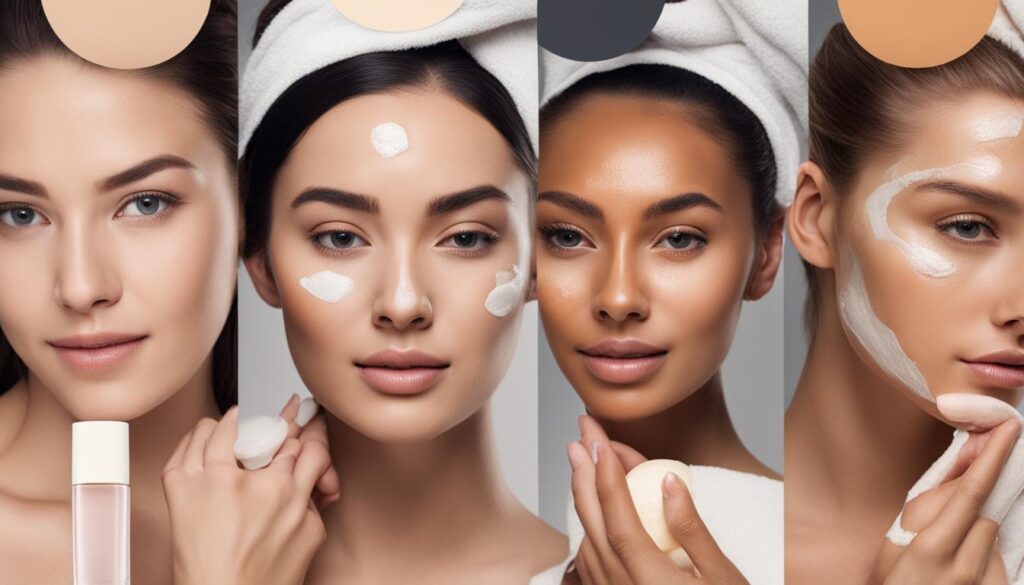
When it comes to skincare, addressing specific skin concerns is crucial for achieving your desired results. Whether you’re dealing with acne, hyperpigmentation, or the signs of aging, incorporating products and ingredients that target these issues can make a significant difference in the health and appearance of your skin.
Targeting Acne
Acne is a common skin concern that affects both teenagers and adults. To combat acne, look for products containing salicylic acid, an active ingredient known for its ability to unclog pores and reduce inflammation. Incorporating salicylic acid into your skincare routine can help remove excess oil, prevent breakouts, and promote clearer skin.
Treating Hyperpigmentation
Hyperpigmentation refers to the dark spots or patches that appear on the skin due to an uneven distribution of melanin. To address hyperpigmentation, consider incorporating ingredients like niacinamide and vitamin C into your daily skincare routine. Niacinamide helps to regulate melanin production, while vitamin C is known for its brightening and antioxidant properties, helping to fade dark spots and even out skin tone.
Fighting the Signs of Aging
As we age, our skin undergoes various changes that can result in wrinkles, fine lines, and loss of elasticity. To combat the signs of aging, look for products containing retinoids, which are derived from vitamin A. Retinoids work by promoting cell turnover and collagen production, reducing the appearance of wrinkles and improving overall skin texture. Incorporating retinoids into your skincare routine can help keep your skin looking youthful and refreshed.
Consulting a dermatologist is highly recommended when addressing specific skin concerns. They can provide professional guidance and recommend targeted treatments or ingredients tailored to your individual needs. A dermatologist can also help monitor the progress of your skincare routine, ensuring that you achieve the desired results safely and effectively.
By incorporating products with active ingredients like salicylic acid for acne, niacinamide and vitamin C for hyperpigmentation, and retinoids for aging, you can effectively address specific skin concerns and enhance the overall health and appearance of your skin.
| Specific Skin Concern | Active Ingredients |
|---|---|
| Acne | Salicylic Acid |
| Hyperpigmentation | Niacinamide, Vitamin C |
| Aging | Retinoids |
Choosing the Right Ingredients

When it comes to skincare, selecting the right ingredients can make all the difference. Incorporating active ingredients into your routine can deliver various benefits to your skin, helping you achieve the healthy and radiant complexion you desire. Three key ingredients to look out for in your skincare products are retinol, hyaluronic acid, and ceramides.
Retinol is a powerhouse ingredient known for its skin-transforming properties. It aids in skin cell turnover, promoting a smoother and more youthful appearance. This ingredient can help combat signs of aging, such as fine lines and wrinkles, making it a valuable addition to any skincare regimen.
Hyaluronic acid is a hydrating superhero that can replenish moisture levels in the skin. It is known for its ability to attract and retain water, providing intense hydration and plumping effects. By incorporating hyaluronic acid into your routine, you can help keep your skin healthy, supple, and well-nourished.
Ceramides play a vital role in maintaining the skin’s moisture barrier. They act as a protective layer, preventing moisture loss and shielding the skin from external aggressors. By using products containing ceramides, you can help strengthen and support your skin’s natural barrier, keeping it hydrated and protected.
Understanding the benefits of these active ingredients empowers you to choose products that cater to your skin type and address your specific concerns. Whether you’re looking to combat signs of aging or boost hydration, incorporating these ingredients into your skincare routine can yield remarkable results.
The Benefits of Choosing the Right Ingredients:
- Promotes skin cell turnover for a smoother complexion
- Hydrates and plumps the skin for a more youthful appearance
- Maintains the skin’s moisture barrier for long-lasting hydration
- Strengthens and protects the skin from external aggressors
By carefully selecting products with these active ingredients, you can optimize the effectiveness of your skincare routine and achieve the healthy, glowing skin you’ve always desired.
Comparison of Active Skincare Ingredients
| Ingredient | Benefits |
|---|---|
| Retinol | Encourages skin cell turnover Reduces the appearance of fine lines and wrinkles |
| Hyaluronic Acid | Intensely hydrates and plumps the skin Improves overall skin texture |
| Ceramides | Maintains the skin’s moisture barrier Protects against environmental stressors |
Building a Morning Skincare Routine
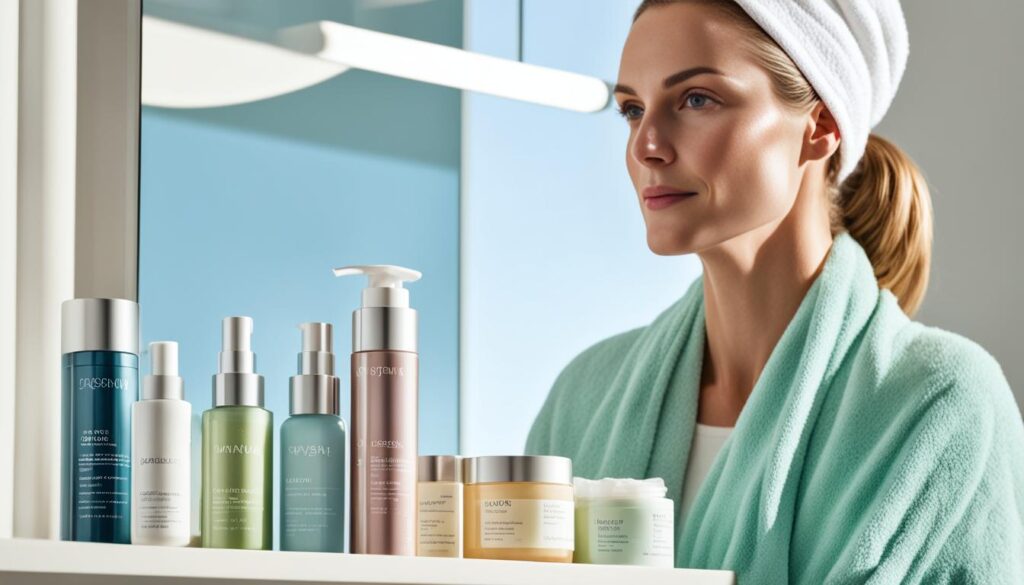
A morning skincare routine is essential for maintaining healthy and radiant skin throughout the day. By following a few simple steps, you can effectively hydrate your skin and protect it from environmental stressors. Here are the key elements of a morning skincare routine:
- Cleansing: Start your day by cleansing your face with a gentle cleanser to remove any impurities or excess oil that may have accumulated overnight. This step prepares your skin for the other products you’ll be applying.
- Vitamin C Serum: After cleansing, apply a vitamin C serum to your skin. Vitamin C is a powerful antioxidant that helps protect your skin from free radicals and brightens your complexion.
- Moisturizer: Hydrate your skin with a moisturizer that suits your skin type. Choose a lightweight formula for oily or combination skin, or opt for a richer moisturizer if you have dry skin. Make sure to massage the moisturizer into your skin using gentle upward motions.
- Sunscreen: The final and most crucial step in your morning skincare routine is applying sunscreen. Protecting your skin from harmful UV rays is essential for preventing premature aging and reducing the risk of skin cancer. Look for a broad-spectrum sunscreen with an SPF of 30 or higher, and apply it generously to all exposed areas of your skin.
Pro Tip: To save time in the morning, consider using a moisturizer with built-in sunscreen. This combination product offers convenience and ensures you’re adequately protected throughout the day.
Following these steps will help you start your day with a healthy and radiant complexion. Remember, consistency is key when it comes to skincare, so make sure to incorporate these steps into your daily routine.
Building a Nighttime Skincare Routine

A nighttime skincare routine is an essential step in your skincare regimen as it allows your skin to repair and regenerate while you sleep. By incorporating specific steps, you can effectively cleanse, nourish, and treat your skin to wake up with a refreshed and glowing complexion.
Double Cleansing for Deep Cleansing
One of the crucial steps in a nighttime skincare routine is double cleansing. It involves using an oil-based cleanser followed by a water-based cleanser to thoroughly remove makeup, dirt, and impurities accumulated throughout the day. Double cleansing ensures a deep cleanse, allowing your skin to breathe and absorb other skincare products better.
Toning for Balance and Hydration
After cleansing, toning is the next step to incorporate into your nighttime routine. Toning helps balance the skin’s pH levels, which can become imbalanced after cleansing. It also prepares the skin to maximize the benefits of other products applied afterward. Choose a toner that suits your skin type and concerns, such as one with hydrating ingredients or soothing properties.
Moisturizing for Skin Hydration
Moisturizing is a vital step in any skincare routine, including your nighttime regimen. After cleansing and toning, applying a moisturizer helps replenish and lock in moisture in the skin. Choose a moisturizer suitable for your skin type, whether it’s lightweight for oily skin or richer for dry skin. By keeping your skin adequately hydrated, you can maintain its elasticity and reduce the appearance of fine lines and wrinkles.
Treating Specific Skin Concerns
In addition to the basic steps, treating specific skin concerns is an important aspect of a nighttime skincare routine. Whether you’re dealing with acne, hyperpigmentation, or other skin issues, incorporating targeted products can help address these concerns effectively. Look for serums or treatments containing active ingredients like retinol, AHAs, or vitamin C to target specific problems and promote skin rejuvenation.
A complete nighttime skincare routine can transform your complexion and promote healthy, glowing skin. By including double cleansing, toning, moisturizing, and targeted treatments, you provide your skin with the necessary care and nourishment it needs during the rejuvenating hours of sleep. Implementing a consistent nighttime routine will help you wake up to a refreshed, revitalized, and radiant complexion.
Skincare Do’s and Don’ts
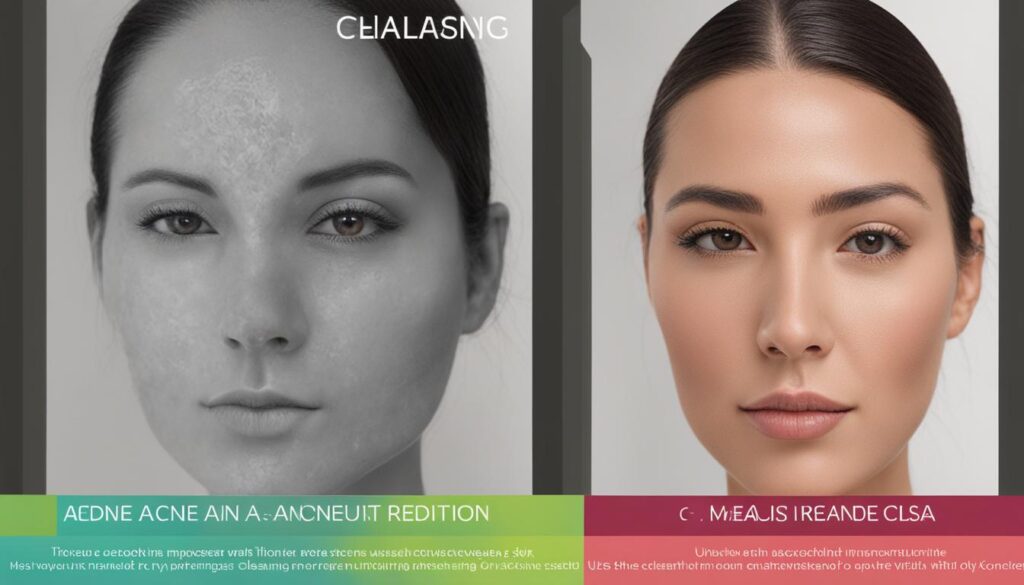
When it comes to maintaining the health of your skin, it’s crucial to follow skincare do’s and don’ts. By adhering to these guidelines, you can ensure that your skincare routine is effective and beneficial for your skin.
Do Conduct a Patch Test
A patch test is a simple yet essential step in introducing a new skincare product into your routine. Before applying the product to your entire face, apply a small amount to a small area of skin to check for any adverse reactions. This can help you avoid potential allergic reactions or irritation.
Give Your Skin Time to Acclimate
When introducing new skincare products or ingredients into your routine, it’s important to give your skin time to adjust and acclimate. Avoid introducing multiple new products all at once as this can overwhelm your skin. Instead, incorporate one new product at a time and allow your skin to adapt before making further changes. Patience is key to getting the best results.
Avoid Rushing
One common mistake people make with their skincare routine is rushing through it. Skincare is a process that requires time and attention. Take the time to cleanse your skin thoroughly, apply products evenly, and massage them in gently for optimal absorption. Rushing can lead to ineffective application and reduce the benefits of your skincare routine.
“Skincare is a journey, not a destination. Take your time and enjoy the process of caring for your skin.”
Remember, skincare routine steps should be incorporated into your daily routine as self-care and should be enjoyed rather than rushed through.
| Skincare Do’s | Skincare Don’ts |
|---|---|
| Conduct a patch test before using new products | Overwhelm your skin with too many new products at once |
| Allow your skin time to acclimate to new ingredients | Ignore signs of skin irritation or reactions |
| Take your time to properly cleanse and apply products | Rush through your skincare routine |
By following these skincare do’s and don’ts, you can optimize the effectiveness of your skincare routine and ensure that your skin receives the care it deserves.
Navigating the World of Skincare Products
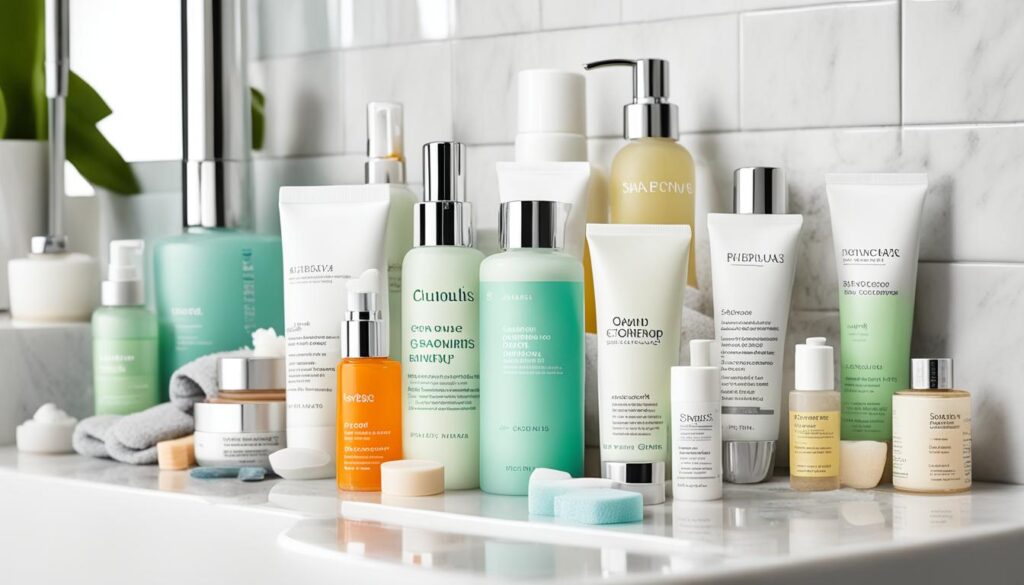
When it comes to skincare, the abundance of products on the market can be overwhelming. With so many options to choose from, how do you navigate through the vast array of skincare products to find the ones that are truly effective and safe for your skin? Here are some tips to help you make informed decisions:
Read Clinical Research
When evaluating skincare products, it’s important to look beyond catchy marketing claims. Clinical research studies conducted by reputable institutions can provide valuable insights into a product’s effectiveness. Look for scientific evidence that supports the claims made by the brand. Check for published studies, peer-reviewed articles, or clinical trial results that back up the product’s key ingredients and benefits.
Consult Professionals
Seeking advice from skincare professionals, such as dermatologists or estheticians, can be immensely helpful. These experts can analyze your skin type, identify your specific concerns, and recommend suitable products based on their expertise. They have in-depth knowledge of various skincare products and ingredients, and can provide personalized recommendations tailored to your individual needs.
Choose for Individual Skin Type and Concerns
Every individual has a unique skin type and specific concerns. What works for one person may not work for another. Consider your skin type, whether it’s oily, dry, combination, or sensitive, and choose products that are formulated for your specific needs. Look for skincare lines that offer customized solutions or products targeting your particular skin concerns, such as acne, hyperpigmentation, or aging.
| Skincare Routine Steps | Key Tips |
|---|---|
| 1. Cleansing | Choose a gentle cleanser suitable for your skin type to remove impurities without stripping away natural oils. |
| 2. Toning | Use a toner to balance the pH levels of your skin and prepare it for better product absorption. |
| 3. Moisturizing | Hydrate your skin with a moisturizer suited to your skin type to maintain its moisture barrier and prevent dryness. |
| 4. Sun Protection | Apply a broad-spectrum sunscreen with SPF to shield your skin from harmful UV rays and prevent premature aging. |
Remember, the journey to finding the right skincare products is a process of trial and error. It’s important to give each product enough time to see if it suits your skin. Keep track of how your skin responds to different products and adjust your routine accordingly. By reading clinical research, consulting professionals, and choosing products tailored to your skin type and concerns, you can navigate the world of skincare products with confidence.
Skincare for Different Life Stages
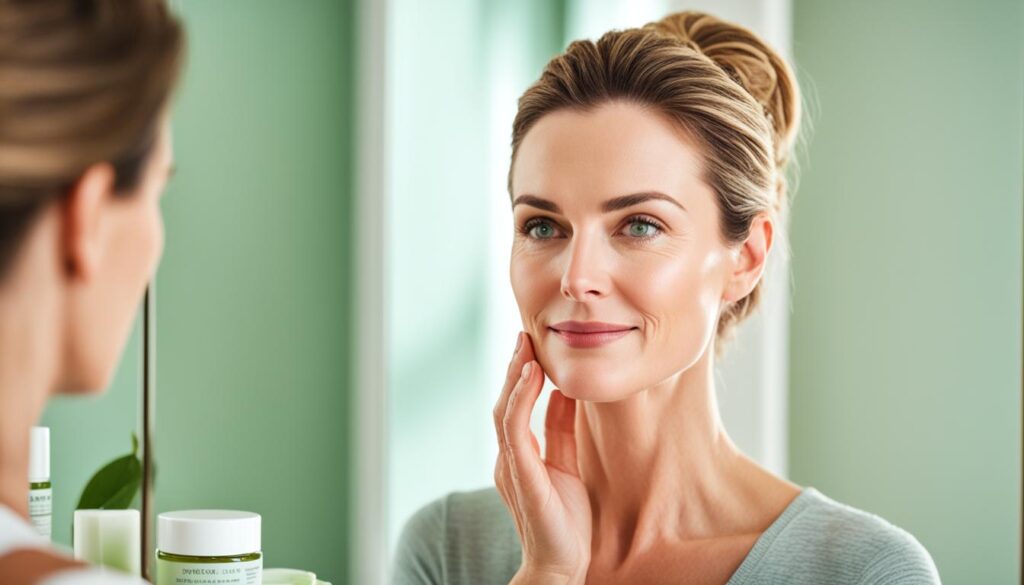
As we go through life, our skincare needs change, requiring adjustments to our skincare routines. Different life stages, such as teenage years and pregnancy, bring about specific challenges that need to be addressed. By tailoring our approach to skincare, we can ensure that our skin remains healthy and radiant. Let’s explore skincare for teenagers and expectant individuals.
Skincare for Teenagers
Teenagers often experience hormonal fluctuations that can lead to skin issues like acne. To address these concerns, it’s important for teenagers to establish a consistent skincare routine. Here are some tips:
- Start with a gentle cleanser: Skincare Routine Steps for teenagers should include a gentle cleanser that helps remove excess oil and dirt without stripping the skin.
- Consider acne-fighting ingredients: Look for products that contain teenagers, which can help reduce inflammation and unclog pores.
- Moisturize the skin: Teenagers may be tempted to skip moisturizer, but it’s important to keep the skin hydrated.
- Apply sunscreen: Protecting the skin from harmful UV rays is crucial for everyone, including teenagers.
“Establishing a skincare routine at a young age can set the foundation for healthy skin throughout life.” – Dr. Jane Smith, Dermatologist
Skincare for Expectant Individuals
Pregnancy brings about various changes in the body, including specific skin conditions that need special attention. Here are some skincare tips for expectant individuals:
- Keep the skin moisturized: Hormonal changes during pregnancy can lead to dryness and itchiness. Expectant individuals should opt for gentle, fragrance-free moisturizers to keep their skin hydrated.
- Avoid harsh ingredients: Certain skincare ingredients, like retinoids, should be avoided during pregnancy. Consult with your healthcare provider to ensure the safety of the products you use.
- Stay mindful of stretch marks: Expectant individuals can use products formulated to prevent and minimize stretch marks. Look for ingredients like vitamin E and shea butter.
- Practice self-care: Pregnancy can be a stressful time, and stress can impact the skin. Taking time for self-care activities such as gentle massages and relaxation exercises can promote overall skin health.
By adapting our skincare routines to accommodate different life stages, we can address the unique needs of our skin. Whether you’re a teenager or an expectant individual, understanding how to care for your skin during these phases is vital for maintaining a healthy complexion.
The Benefits of Natural Skincare

When it comes to skincare, natural products have gained significant popularity due to their numerous benefits. Natural skincare not only provides essential nourishment to the skin but also offers protection against environmental aggressors. What sets natural skincare apart is its suitability for all skin types, thanks to the gentle and safe formulas commonly used. Whether you have oily, dry, combination, or sensitive skin, incorporating natural skincare products into your routine can be beneficial.
One of the key advantages of natural skincare is the presence of essential vitamins, minerals, and antioxidants. These ingredients work together to promote a healthy complexion and address specific skin concerns. Vitamins like vitamin C and vitamin E provide antioxidant protection, combating free radicals and preventing premature aging. Minerals such as zinc and magnesium enhance skin vitality and improve overall skin health. Antioxidants like green tea extract and grapeseed oil help reduce inflammation and soothe the skin.
Moreover, natural skincare formulas are developed with a focus on safety and efficacy. By avoiding harsh chemicals and synthetic ingredients, natural products minimize the risk of allergic reactions or skin irritation. This makes them suitable even for individuals with sensitive skin or those prone to allergies. Additionally, the gentle nature of natural skincare formulas ensures that they nourish and protect the skin without disrupting its natural balance.
Another advantage of natural skincare is its contribution to environmental sustainability. Natural skincare brands often prioritize eco-friendly practices, using organic and sustainably sourced ingredients. By supporting these brands, consumers can play a part in protecting the environment and promoting a more sustainable beauty industry.
Incorporating natural skincare into your routine can provide a range of benefits, from nourishing and protecting your skin to promoting overall well-being. By harnessing the power of nature’s ingredients, you can achieve a glowing complexion while embracing safe and gentle formulas suitable for all skin types.
Comparison of Natural Skincare vs. Synthetic Skincare
| Criteria | Natural Skincare | Synthetic Skincare |
|---|---|---|
| Efficacy | Provides essential nutrients and antioxidants | May contain potent active ingredients but may also include harsh chemicals |
| Safety | Gentle formulas, minimizing the risk of skin irritation | Potential for allergic reactions or skin sensitivity |
| Sustainability | Often uses organic and sustainably sourced ingredients, supporting eco-friendly practices | May rely on synthetic ingredients and unsustainable manufacturing processes |
The best order to apply skin care products
The best order to apply skincare products is crucial for maximizing their effectiveness. Typically, start with cleanser to remove impurities, followed by toner to balance pH levels. Next, apply serums with active ingredients like vitamin C or hyaluronic acid for targeted benefits. Then, use moisturizer to hydrate and lock in moisture. Eye cream can be applied gently around the eye area to address specific concerns like puffiness or dark circles. Finish with sunscreen in the morning to protect against UV damage. This sequence ensures each product can penetrate the skin effectively, delivering the desired results for a healthy, radiant complexion.
SOOTHE Daily Mineral Sunscreen Broad Spectrum SPF 30
SOOTHE Daily Mineral Sunscreen Broad Spectrum SPF 30 offers reliable protection against harmful UV rays while soothing and nourishing the skin. Its mineral-based formula contains zinc oxide and titanium dioxide, providing broad-spectrum coverage without clogging pores. This lightweight sunscreen absorbs quickly, leaving behind a non-greasy finish, making it suitable for daily use. Enriched with antioxidants and botanical extracts, it helps to defend against environmental aggressors and minimize the risk of premature aging. With SPF 30, it shields the skin from sun damage, reducing the risk of sunburn and supporting a healthy complexion, making it an essential part of your skincare routine.
7. Moisturizer
Moisturizer is a crucial step in any skincare routine, providing hydration and nourishment to the skin. It helps to maintain the skin’s natural moisture barrier, preventing dryness and promoting a smooth, supple complexion. Choose a moisturizer tailored to your skin type, whether it’s dry, oily, combination, or sensitive. Look for key ingredients like hyaluronic acid, glycerin, or ceramides to replenish moisture and improve skin texture. Applying moisturizer daily can also help to soothe irritation, reduce the appearance of fine lines, and protect against environmental stressors. Incorporating moisturizer into your routine ensures your skin stays hydrated and healthy-looking.
Also Read: Optimal Combination Skin Care Routine Tips
Conclusion
Establishing an essential skincare routine is key to achieving radiant and healthy-looking skin. By following the core steps of cleansing, toning, moisturizing, and sun protection, you can create a regimen that addresses your specific concerns and promotes a glowing complexion. Customization is crucial, as it allows you to tailor your routine to your individual needs, skin type, and targeted ingredients.
Consulting skincare professionals and staying updated on the latest research will empower you to make informed choices for your skin. Remember, it takes time for your skin to acclimate to new products, so give yourself a generous timeframe to evaluate the effectiveness of your routine. With dedication and consistency, you’ll be on your way to enjoying the benefits of an essential skincare routine and achieving the radiant skin you desire.
Investing in the right skincare products and practices shows that you prioritize self-care and value the health of your skin. So take the necessary steps towards maintaining an essential skincare routine, and let your radiant skin be a reflection of your inner beauty and confidence.
FAQs
Q: What are the essential skincare routine steps for radiant skin?
A: The essential steps for a skincare routine include cleansing, toning, applying serum, moisturizing, applying sunscreen during the day, and using night cream before bed.
Q: In what order should I apply skincare products for the best results?
A: For the best results, it is recommended to apply skincare products in the following order: cleanser, toner, serum, eye cream, moisturizer, sunscreen during the day, and night cream at night.
Q: Why is sunscreen important in a skincare routine?
A: Sunscreen is important in a skincare routine to protect the skin from harmful UV rays that can cause premature aging, sunburn, and skin cancer.
Q: What is the best type of sunscreen to use for all skin tones?
A: Mineral sunscreen, also known as physical sunscreen, is the best type to use for all skin tones as it provides broad-spectrum protection without leaving a white cast on the skin.
Q: When should I apply vitamin C serum in my skincare routine?
A: Vitamin C serum is best applied in the morning as it helps protect the skin from environmental damage and promotes a brighter complexion.
Q: Why is it important to wash your face before applying skincare products?
A: Washing your face before applying skincare products helps to remove dirt, oil, and impurities from the skin, allowing the products to be absorbed more effectively.
Q: How can I improve my skin tone and texture through a skincare routine?
A: By following a consistent skincare routine that includes exfoliation, hydration, and protection from the sun, you can improve your skin tone and texture over time.





